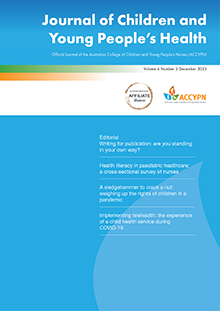Maria Ronan, Karen Eagleson, Philippa Fielden, Nicola Sutton, Sharon Gilchrist, Sandra Schilling, Loretta Scaini, Amanda Ullman
Background There is currently limited exploration of how paediatric nurses understand and contextualise health literacy in everyday clinical practice. This study aimed to develop an understanding of health literacy among paediatric nurses in their clinical practice.
Methods A mixed methods cross-sectional survey of nurses at a specialist, state-wide paediatric hospital and health service was undertaken between 28 January – 22 February 2019. Quantitative data were analysed descriptively in Stata, and qualitative data analysed thematically.
Findings In total, 248 nurses completed the survey (15% response rate). Whilst almost all respondents identified the high importance of health literacy in patient outcomes (96%), only 20% of respondents had previous health literacy education and exhibited knowledge of the meaning of health literacy. Conceptually, health literacy definitions were based across the domains of ‘health’ and ‘literacy’, varying between biomedical health, self-management and health systems, and between terminology to consumer informed decision-making and participation. Previous learning was identified predominantly as self-directed or through workplace experience, with face-to-face (82%) and online sessions (65%) reported as the most beneficial education methods.
Discussion Within this novel paediatric nursing population study, limited understanding of health literacy was reported, potentially impacting consumer knowledge requirements for quality care.
Conclusion Although limited by a low response rate, this study demonstrates that most nurses consider health literacy highly important for patient outcomes. The introduction of multi-modal health literacy education programs, predominantly conducted face-to-face, may be beneficial in improving nursing knowledge and skills.



